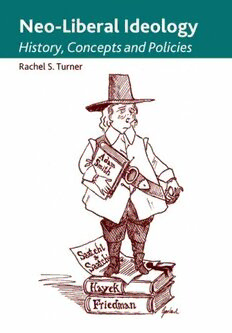
Neo-Liberal Ideology: History, Concepts, and Policies PDF
257 Pages·2008·1.46 MB·English
Most books are stored in the elastic cloud where traffic is expensive. For this reason, we have a limit on daily download.
Preview Neo-Liberal Ideology: History, Concepts, and Policies
Description:
Neo-liberalism is one of the most influential ideologies since the Second World War, yet little research has been devoted to the movement of ideas that constitute its main body of thought. This book fills the void, providing an original account of neo-liberalism's intellectual foundations, development, and conceptual configuration as an ideology.It presents a comparative study of the development and the nature of neo-liberal ideas in the national contexts of Germany, Britain and the United States since the twentieth century, addressing the following questions: What are neo-liberalism's intellectual origins? What influence did neo-liberalism have on public policy debates? What are neo-liberalism's core concepts and how have they been interpreted in different national contexts that make it a distinctive ideology? In answering these questions, the book provides a deeper insight into the historical and intellectual origins and conceptual configuration of an ideology that reshaped politics and societies across the world. Key Features:Explores the intellectual and historical genesis of neo-liberalismPresents a case study of ideological growth and formationConcentrates on the four core concepts at the centre of neo-liberal ideology: the market, welfare, the constitution and propertyWritten in a clear and accessible styleOffers a comprehensive analysis of neo-liberalism as both an ideology and a political movement
See more
The list of books you might like
Most books are stored in the elastic cloud where traffic is expensive. For this reason, we have a limit on daily download.
